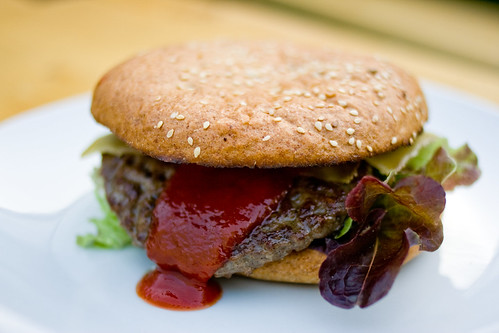Yes, sometimes I have to get some things off my chest. Like John McClane in any Die Hard movie, if there was someone else to do the job, I would let them do it.
But. There's. Not.
So I am doing what nobody else will, hopefully signalling the clarion call to bring this mad world back to some semblance of normalcy and intelligence. I recently found the following:

An article in Time.com noted that ketchup flows out of a glass bottle at a rate of .028 miles per hour. That's slower than a Galapagos tortoise, which, according to the San Diego Zoo, zips along at a blazing 0.16 miles per hour, or almost six times faster than ketchup.
But impatiently tapping your ketchup bottle soon might be a thing of the past. Dave Smith, a PhD candidate at MIT, and a team of MIT mechanical engineers and nano-technologists have offered a posible solution to this ketchup flow problem. After months of research, Smith and his team developed LiquiGlide, which they define as a "kind of structured liquid [that's] rigid like a solid, but lubricated like a liquid." The researchers say that coating the inside of a bottle with LiquiGlide will cause ketchup and other sauces to slide out faster than a Galapagos tortoise. Smith claims that the sauce industry, which rakes in $17 billion a year, would love to get their hands on the invention.
The Time.com article concluded:"Let's hope some big [ketchup] companies bite. I'm tired of waiting five minutes for ketchup to land on my cheeseburger."
But. There's. Not.
So I am doing what nobody else will, hopefully signalling the clarion call to bring this mad world back to some semblance of normalcy and intelligence. I recently found the following:

An article in Time.com noted that ketchup flows out of a glass bottle at a rate of .028 miles per hour. That's slower than a Galapagos tortoise, which, according to the San Diego Zoo, zips along at a blazing 0.16 miles per hour, or almost six times faster than ketchup.
But impatiently tapping your ketchup bottle soon might be a thing of the past. Dave Smith, a PhD candidate at MIT, and a team of MIT mechanical engineers and nano-technologists have offered a posible solution to this ketchup flow problem. After months of research, Smith and his team developed LiquiGlide, which they define as a "kind of structured liquid [that's] rigid like a solid, but lubricated like a liquid." The researchers say that coating the inside of a bottle with LiquiGlide will cause ketchup and other sauces to slide out faster than a Galapagos tortoise. Smith claims that the sauce industry, which rakes in $17 billion a year, would love to get their hands on the invention.
The Time.com article concluded:"Let's hope some big [ketchup] companies bite. I'm tired of waiting five minutes for ketchup to land on my cheeseburger."
I had so many thoughts upon reading this, in this order...
- Has nobody heard of the squeeze bottle?
- Who is taking time to measure the speed of ketchup?
- Were there too many people measuring the softness of toilet paper?
- We haven't cured cancer yet, right? So why is there a team of doctors, engineers and nano-technologists spending their time on sauce?
- Will cancer patients die happier if they got ketchup on their last burger more quickly?
- How does the Galapagos turtle feel about this comparison? I picture him somewhere asking how he got dragged into this conversation.
- How good do the people working on this feel at the end of the day? "Honey, I think we've almost got this ketchup debacle fixed! When people see how blazing fast their ketchup comes out, they'll think of our names..."
So many questions. I haven't even gotten into issues about the size of the bottle. After all, if this LiquiGlide is going to be taking up space in the ketchup bottle that could be filled with...you know...ketchup, are we going to see a larger bottle?
I suppose these questions will have to wait, some until Heaven, when well have plenty of time to wait for ketchup to spill onto our burgers. Maybe this is just one more reason to look forward to Heaven.
What about you? Do you hate waiting for sauce?
Comments